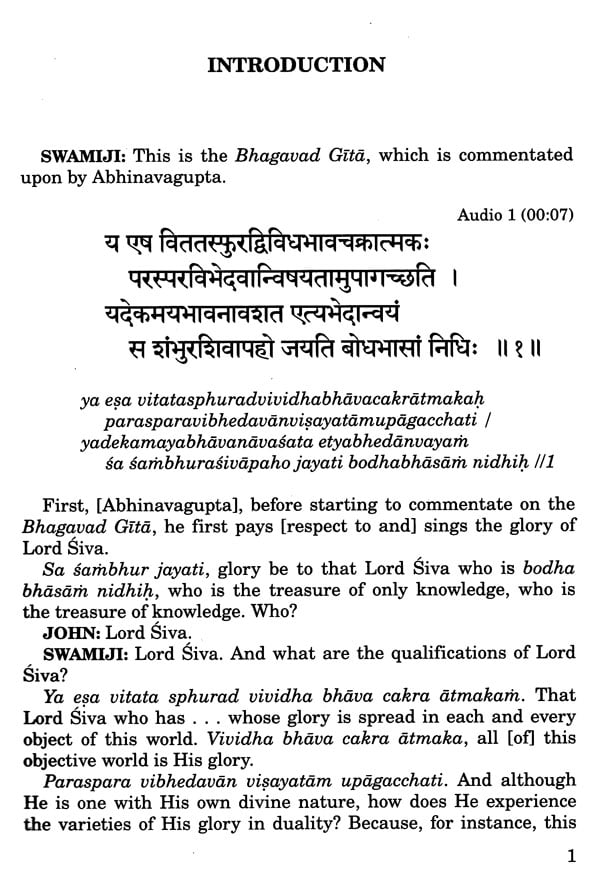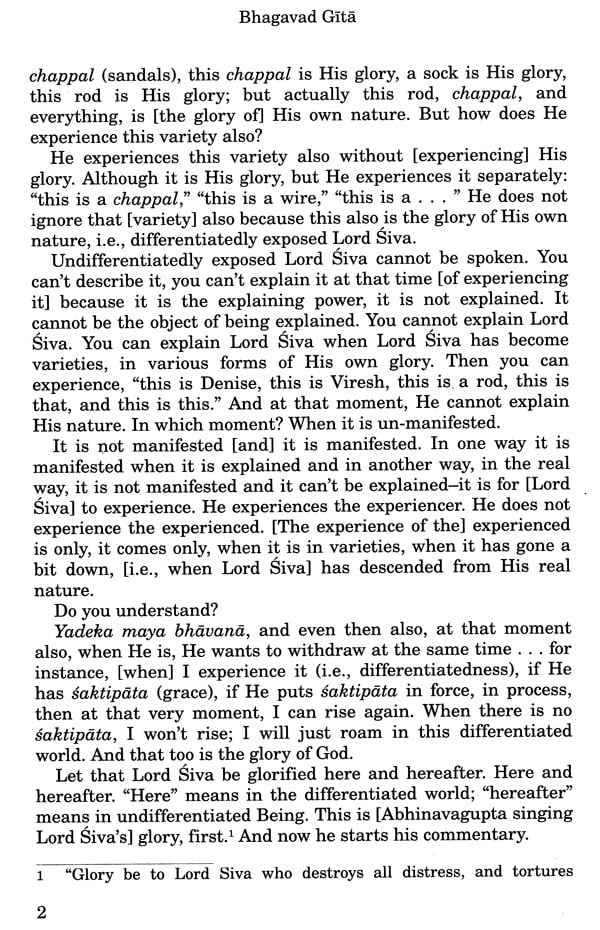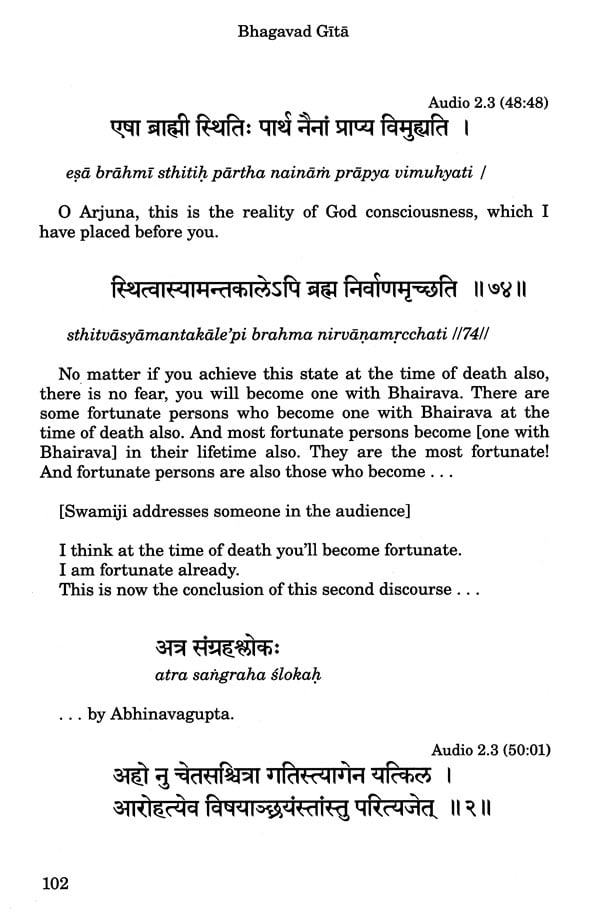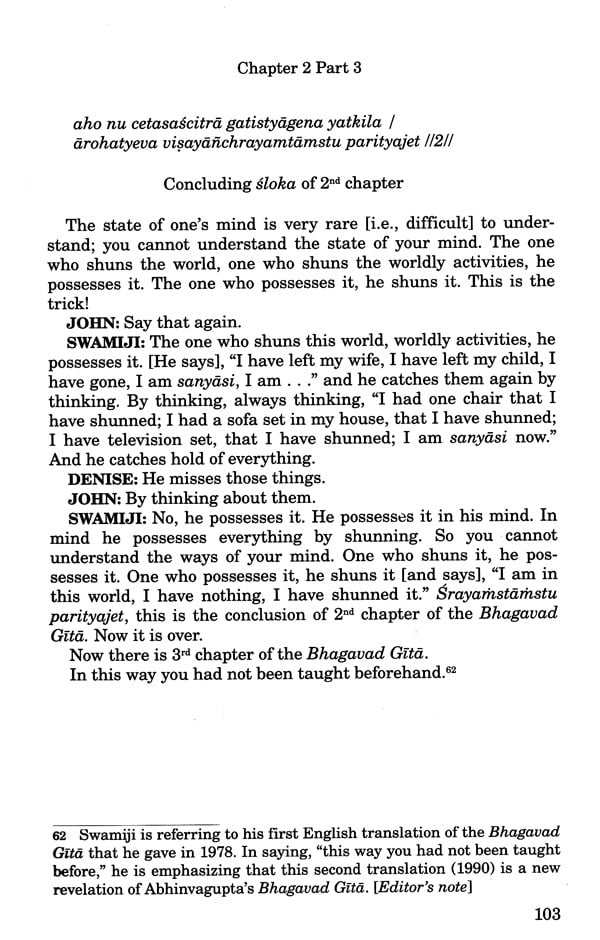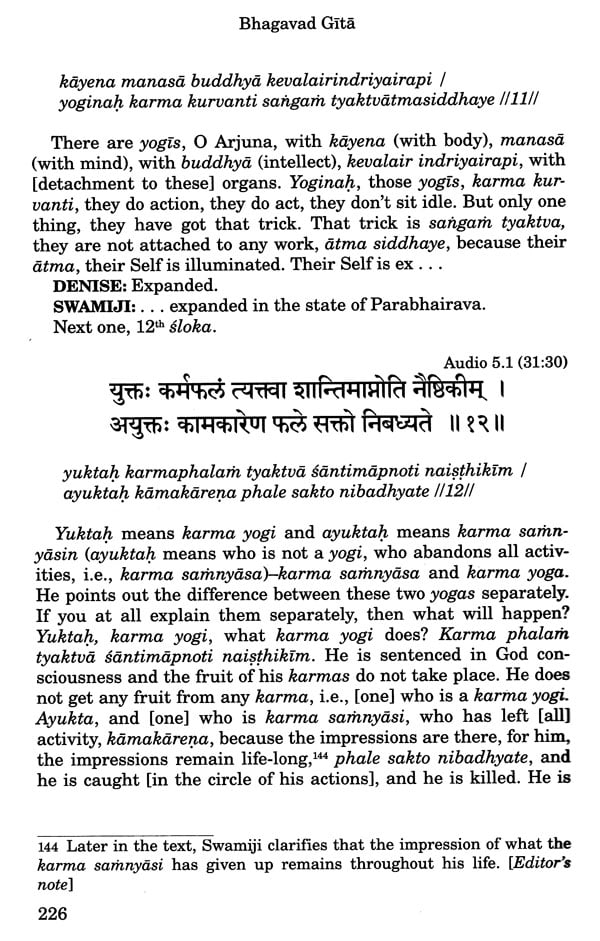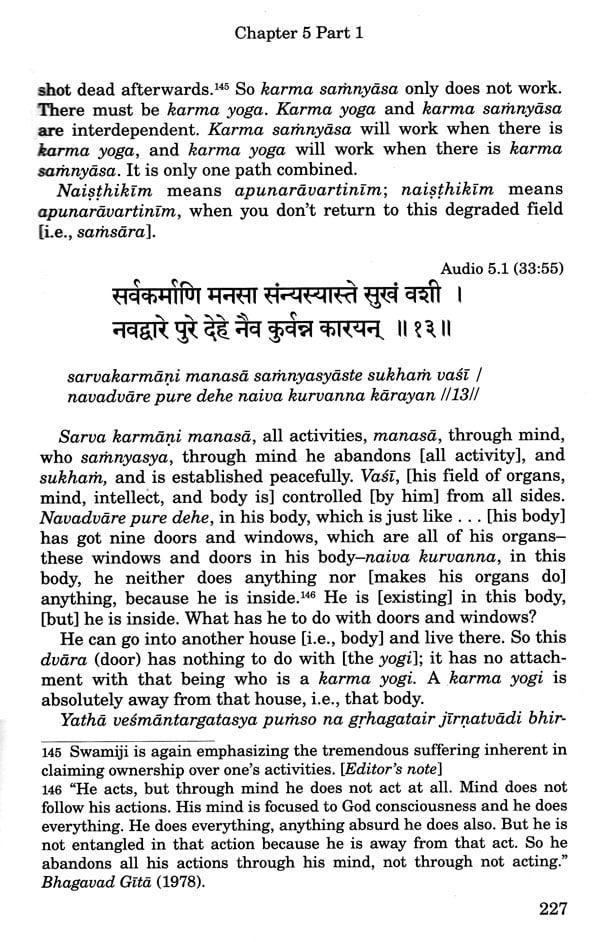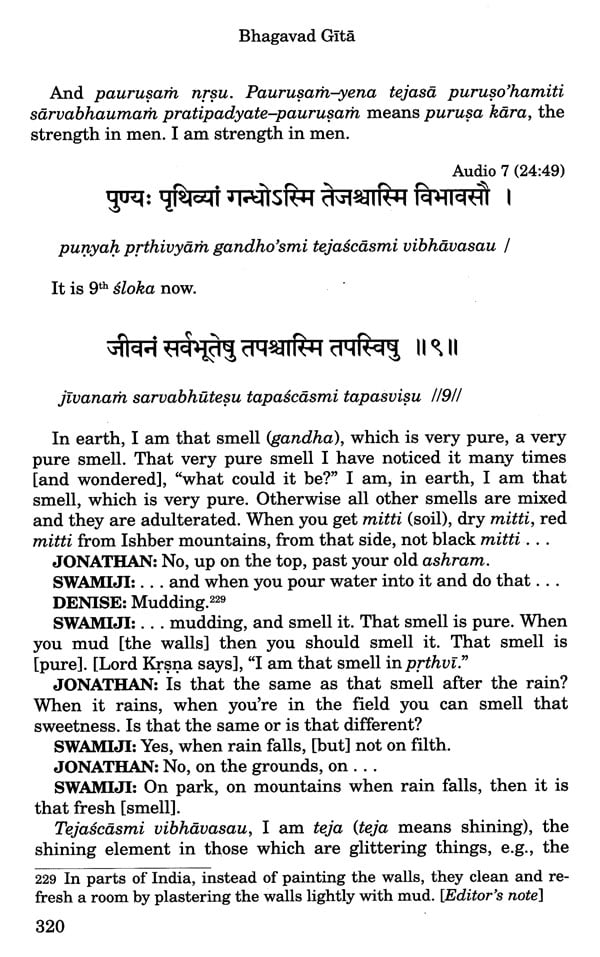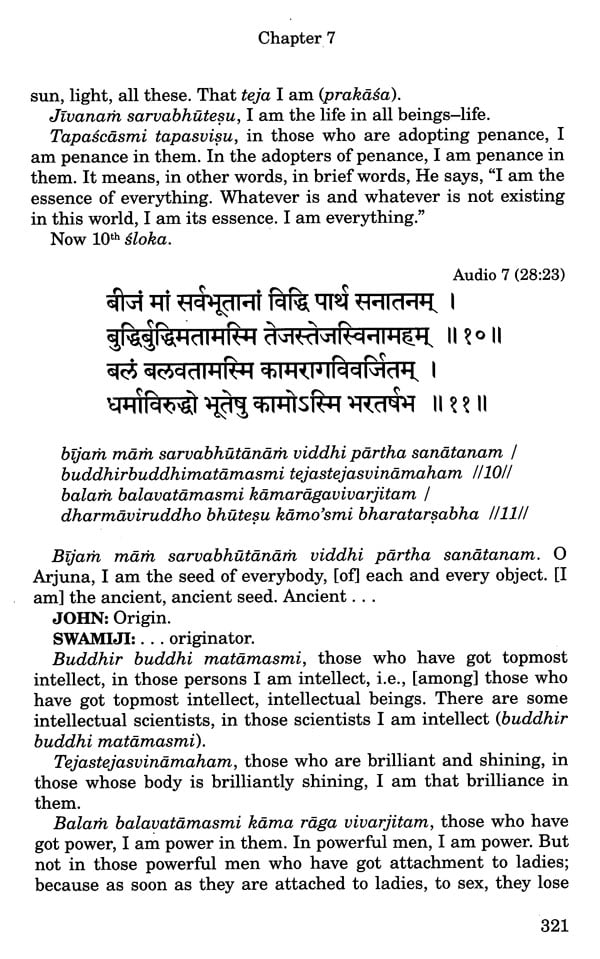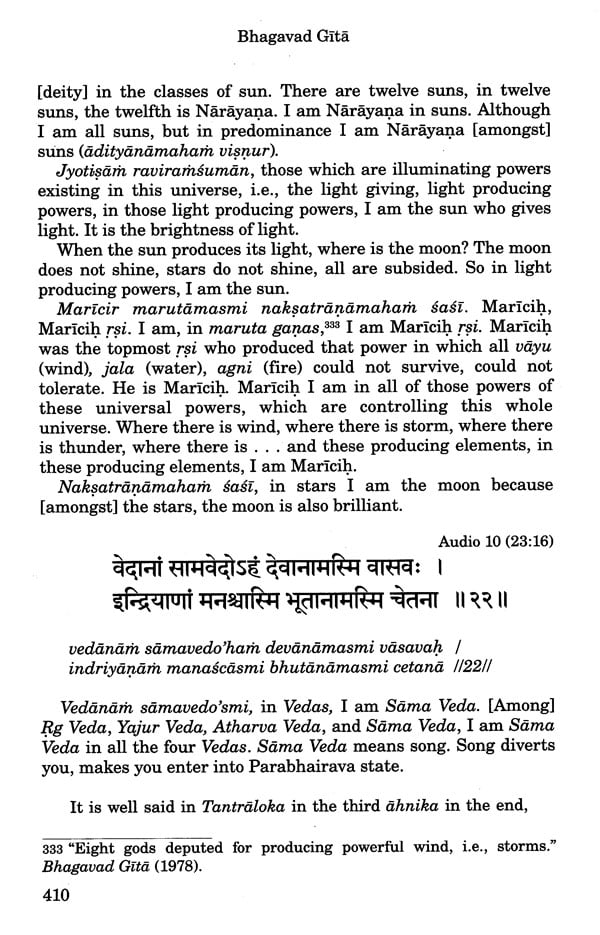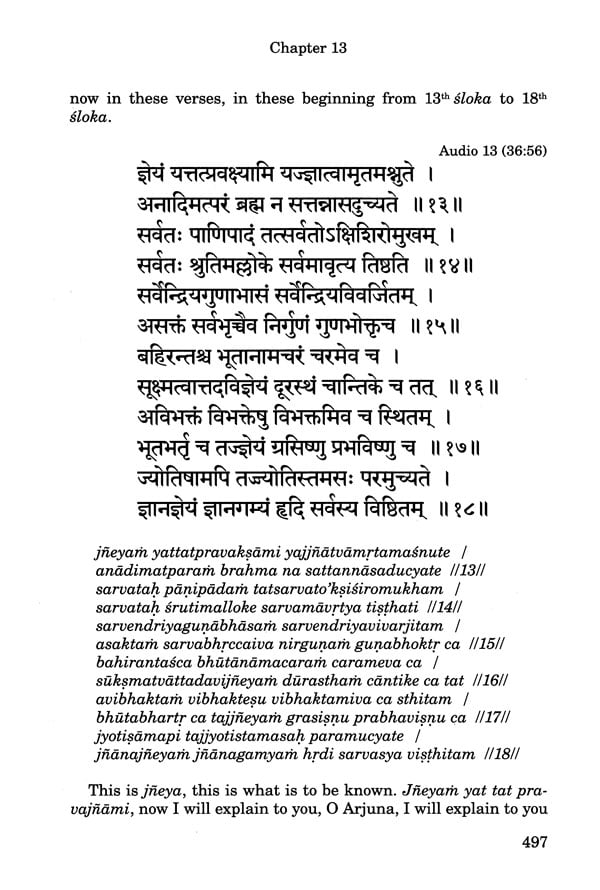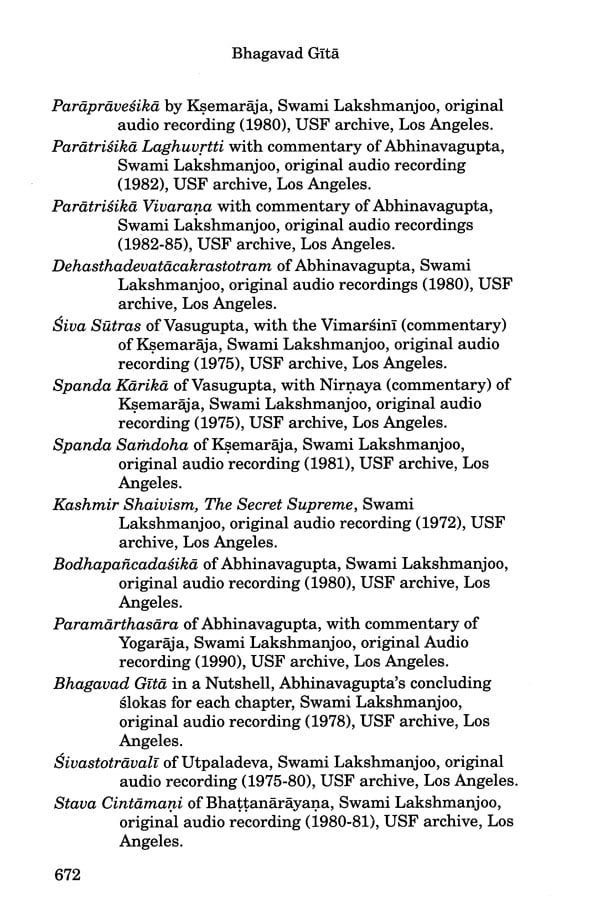
Bhagavad Gita in the Light of Kashmir Shaivism
Book Specification
| Item Code: | NAZ488 |
| Author: | Swami Lakshmanjoo |
| Publisher: | Ishwar Ashram Trust |
| Language: | English and Sanskrit |
| Edition: | 2013 |
| ISBN: | 9780981622811 |
| Pages: | 686 with CD |
| Cover: | HARDCOVER |
| Other Details | 10.00 X 7.00 inch |
| Weight | 1.18 kg |
Book Description
In this multimedia Study Set, Swami Lakshmanjoo, the great philosopher-saint of Kashmir Shaivism, reveals the secrets of one of the most revered scriptural texts of India, the Bhagavad Gita, "The Song of God." Basing his revelation on Abhinavagupta's own commentary on the Gita, the Gitarthasamgraha, "the Essence of the Gita," Swamiji unveils the long-hidden meanings of this sacred text in the light of Kashmir Shaivism.
Swamiji tells us that, "Freedom from all our miseries, as Abhinavagupta boldly declares, can neither be obtained through the renunciation of the world, nor by hatred of this world, but by experiencing the presence of God everywhere." Now, at long last, the profound secret meanings of "the Lord's Song" are being revealed for the spiritual illumination of all mankind.
Swami Lakshmanjoo was born in Srinagar, Kashmir on May 9, 1907. He was the most recent and the greatest of the saints and masters of the tradition of Kashmir Shaivism. Having a deep understanding of the philosophy and practices of Kashmir Shaivism, he was like a splendid and shining rare jewel. From early childhood he spent his life studying and practicing the teachings of this unique sacred tradition. Because of his intellectual power and strength of awareness, he realized both spiritually and intellectually the reality of its thought.
Being born with a photographic memory, learning was always easy for him. In addition to complete knowledge of Kashmir Shaivism, he had a vast knowledge of the traditional religious and philosophical schools and texts of India. When translating or teaching he would freely draw on other texts to clarify, expand, and substantiate his teaching. He could recall an entire text by simply remembering the first few words of a verse.
In time, his reputation as a learned philosopher and spiritual adept spread. Spiritual leaders and scholars journeyed from all over the world to receive his blessings and to ask him questions about various aspects of Kashmir Shaiva philosophy. He gained renown as a devotee of Lord Shiva and as a master of the non- dual tradition of Kashmir Shaivism.
Throughout his life, Swamiji taught his disciples and devotees the ways of devotion and awareness. He shunned fame and recognition and did not seek his own glory. He knew Kashmir Shaivism was the most precious jewel and that, by God’s grace, those who desired to understand would be attracted to its teachings. His earnest wish was for Kashmir Shaivism to be preserved and made available to all humankind.
In 1990, in Nepal, during his explanation of the sixth chapter of the Bhagavad Gita, Swamiji gave a rare glimpse into the full- ness and glory of his own experience.
"I was smoothly going on with my practice and abruptly Saktipata [grace] came and threw all its force in me. It was tivra tivra (super-supreme) saktipdta. And then it happened and I was newborn. I became so great. I don’t mean to boast but this is what happened. I was newly reborn. And, because I had to become Bhairava, I had to experience all of the states of yoga. And it happened, everything happened. I had all experiences; and cidadnanda also, jagaddnandae also. Everything happened. You can’t imagine the ways of Saktipata."
On the 27% of September 1991, Swami Lakshmanjoo left his physical body and attained the great liberation.
Kashmir Shaivism is a magnificently profound yet practical theology, which teaches the radical unity of God and creation. Kashmir Shaivism emphasizes the importance of an intellectual comprehension of its philosophy and cosmology as well as a direct realization of its truth. According to this system, truth cannot be grasped by the intellect alone; truth must finally be apprehended through direct experience. On account of its emphasis on praxis, Kashmir Shaivism has relied heavily upon its oral tradition, which, through an unbroken line of masters and disciples, has preserved and passed along the secrets and subtleties of its impeccably detailed path towards Self- realization.
Swami Lakshmanjoo embodies the teaching and experience of Kashmir Shaivism. He has a profound intellectual and spiritual understanding of this great tradition, which is made evident in all of his recorded lectures. Swamiji was an extraordinary man who dedicated his whole life to the study and practice of Kashmir Shaivism. He was a selfless devotee of Lord Siva and his life was marked by the continual remembrance and celebration of the Divine.
Swamiji’s manner of teaching is traditional and inspiring. His lectures are always given through the medium of scripture. The verses he explains are in Sanskrit, the traditional philosophical and liturgical language of India. In all of his lectures, Swamiji chants the Sanskrit verses before translating and illuminating their meaning. His command of the Sanskrit language and his ability to explain the most difficult and esoteric concepts with simplicity and eloquence earned him an honorary degree — Dr. of Letters — from the Sampurnanand Sanskrit University in Varanasi (Benares) in 1965. This award was instigated by the eminent scholar Mahamahopadyaya Pandit Gopinath Kaviraj, principal of the Sanskrit University.
Swamiji became interested in learning Sanskrit as a young boy. One day he overheard his father reciting verses from Utpaladeva’s Sivastotravali. Swamiji was enchanted with the sound of these verses and asked his father to explain their meaning. His father admitted that he did not actually under- stand Sanskrit and was therefore unable to provide Swamiji with the meaning of the verses. Burning with the desire to know the meaning of these verses, Swamiji requested his father to find him a reputable teacher who could teach him Sanskrit. Pleased by this request, his father found him a reputable teacher and Swamiji began his study of Sanskrit.
Swamiji learned Sanskrit in the traditional fashion by first reciting and memorizing the 3,959 rules of Sanskrit grammar, which were composed by the great Sanskrit grammarian, Panini, in his masterwork, the Astadhydyi. Swamiji then began to study the language from the Kashmir Shaiva point of view. In doing so, he came to understand that every Sanskrit letter represented a particular element of the universe, and the entire body of the Sanskrit alphabet represented the kingdom of God. With a deep understanding of the fundamentals of the language, the constant guidance of his master, Swami Mahatabkak, and through his own contemplative experience, Swamiji was able to comprehend the meaning of every Kashmiri Shaivite scripture that he came Across.
Swamiji was extremely well-read. He was well-informed in Eastern and Western religious and philosophical traditions. Swamiji would freely draw upon other texts and commentaries to further clarify, expand, and substantiate his lectures. He could recall any text by simply remembering the first few words of a verse. His mind was so clear and focused that he held countless verses in his active memory, and he could draw on them as needed. I once asked him if he ever forgot a verse. He replied, "if I see or read anything, I remember it."
Book's Contents and Sample Pages


